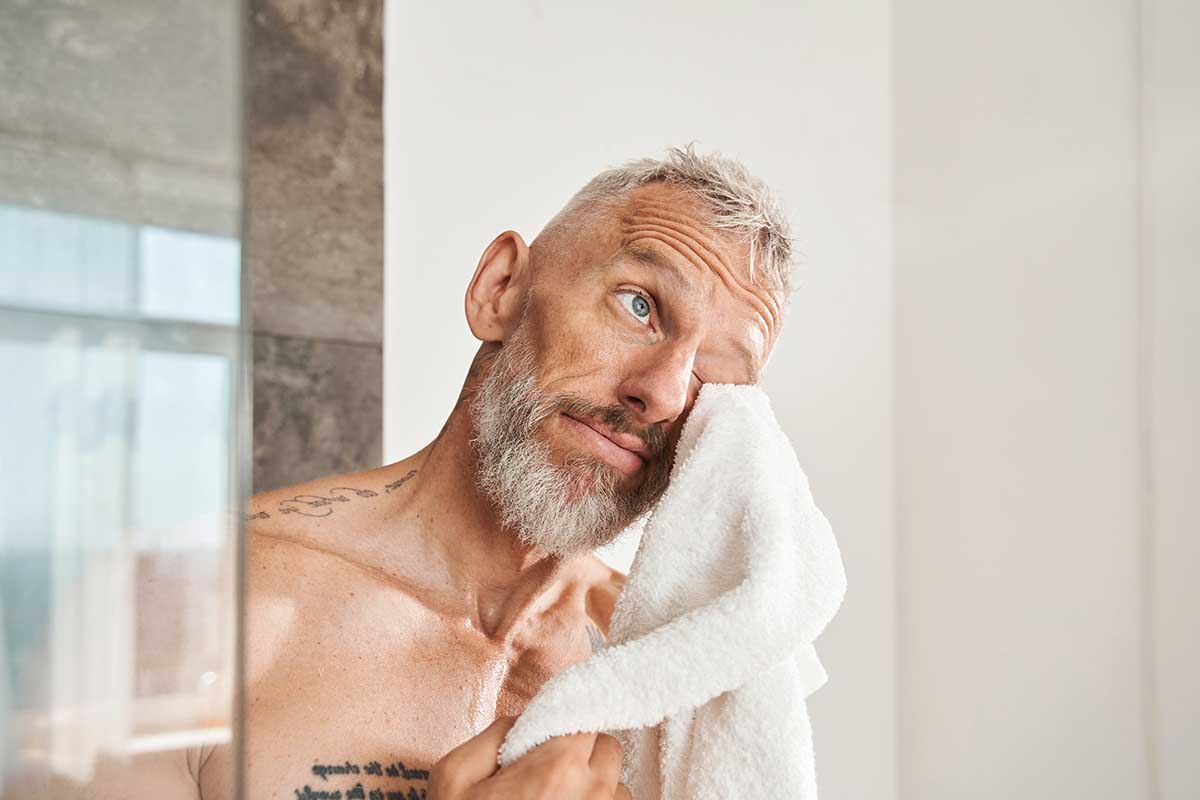Advertisement
Man in the Mirror
Caring for your appearance after a cancer diagnosis
Fact-Checked
This article has been written and fact-checked by experts in the field.

Approximately four out of 10 Canadian men will develop cancer during their lifetime. Although we often focus on the diagnosis and treatment itself, the research is clear: dealing with cancer isn’t just about the disease, but also about caring for your social and psychological wellness. This includes your physical appearance and helping yourself to look your best to feel even better.
Advertisement
Appearance affects men’s cancer journey
When you’re going through treatment, the things that may save your life—chemotherapy, immunotherapy, radiation, for example—can also temporarily change your life.
Specifically, it can change the person looking back at you when you gaze into the mirror. Side effects of treatment often include
- hair loss (including beards, eyebrows, and body hair)
- weight loss
- skin irritation
These changes affect a man’s body image, identity, and confidence, and they can even cause men to withdraw from their friendships, careers, and social networks.
Researchers know that caring for your self-confidence and body image is critical when journeying through cancer, but it’s still an area that isn’t talked about a lot.
“When you’re going through treatment, you have these appearance changes that can cause people to treat you like a cancer patient,” says Sue Larkin, vice-president of programs at Look Good Feel Better, an Ontario-based charity. “You’re no longer their buddy or colleague or father—they see this new visual identity, and they start treating you differently.
“It’s very unnerving to not even recognize your old self,” says Larkin. “And sometimes, you don’t want to share your health diagnosis with others and don’t want your physical appearance to make it apparent. This can really have an impact on your psychosocial health.”
Advertisement
Take back your story
Many men feel a lack of control when they receive their diagnosis. “We surveyed men facing cancer, and received feedback from men in our workshops,” says Larkin, “and that idea of control came up repeatedly. Men often need just one thing they feel they still have some control over.”
It’s also about self-confidence. “When men are feeling self-conscious or not confident about their appearance, they tend to withdraw from the social support and activities they need,” warns Larkin. “And when we’re going through any sort of crisis, including cancer treatment, that’s the last thing we should be doing.”
For example, when you are more connected to your social network, it improves your recovery odds, boosts your emotional health, reduces stress, and helps you manage the impacts of treatment.
Don’t let concerns about your physical appearance hold you back.
Advertisement
Try these easy style tips
Larkin’s charity is the only national Canadian program of its kind to help men with cancer manage their physical appearances. Her team coaches men on how to boost their mental health and self-confidence when overcoming cancer, specifically through grooming and self-care.
Advertisement
Shaving
Be slow and cautious when shaving, and switch to gentle products designed for sensitive skin. “When going through treatment, your immune system can be compromised,” says Larkin. “We talk a lot about safe shaving techniques. You want to avoid nicks or cuts because infection can get in, and that’s the last thing you want to add to what you’re going through.”
Advertisement
Skin care
Cancer treatments often result in flaky, irritated, or red skin. Larkin recommends learning how to use the right moisturizers, as well as products such as BB cream—moisturizer with a touch of pigment—to even out skin colour.
Advertisement
Sun protection
You may be more sensitive to the sun. Larkin recommends using sunscreen, plus hats if you’re experiencing hair loss.
Advertisement
Hair loss
Seventy percent of men lose their hair when they undergo treatment. “You might want to shave your hair before losing your hair, so it’s more of a transition and less of a drastic change,” suggests Larkin.
Her group also teaches men to use tools and techniques to disguise thinning eyebrows. “If guys aren’t comfortable with a brow pencil, try eyeglasses,” says Larkin. “A pair of thick-framed glasses—even without prescription lenses—frames the eyes and masks that loss of brows.”
Advertisement
You aren’t alone
“Our workshops don’t just give tips to help men take back control of their appearance,” notes Larkin. She says guys find a lot of comfort and self-confidence when they’re gathered with other men experiencing the same thing.
“Our workshops create a supportive care environment and an opportunity to connect and ask questions with men who understand your worries,” says Larkin. “Many guys will say, ‘I didn’t want to ask my doctor these questions, because I thought it might be silly or just vain.’ It’s not vanity. This is about your self-care, your mental health, and feeling like yourself again.”
Get connected
Look Good Feel Better offers bilingual online workshops about self-care for men. Sign up and get a free kit of grooming products by visiting lgfb.ca.
Handsome supplements
These supplements may help support your outward appearance and health during cancer treatment. Always talk to your doctor before adding something new to your routine.
Omega-3s
Omega-3s may slow tumour growth and may reduce sun sensitivity, dryness, and irritation in your skin.
Zinc
Zinc may boost your immunity and healing process, and may support hair growth.
Whey protein
Many men struggle with weight loss and muscle loss when in cancer treatment. Whey protein can help mitigate these effects.





